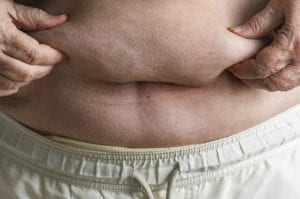The potential benefits and risks of artificial sweeteners and diet sodas are hotly debated. Critics state that artificial sweeteners and diet sodas are fueling obesity [1, 2], increasing the risk for diabetes and cardiovascular disease [2, 3], and of causing metabolic derangements.[2]
A popular argument against consumption of sweet-tasting but non-caloric or reduced-calorie food and beverages is that this interferes with appetite and physiological energy intake regulation.[2]
Find out what latest research shows…
In March 2015, an observational study was published which created headlines warning that diet soda intake is linked to growing bellies.[4] However, as is often the case with observational studies that reach contradictory conclusions (see below on the current state of evidence), the study has several weaknesses. To start with – the study, which was small, only included people aged 65 years and older. The data was collected in the early 1990s to early 2000. Thus the study data is over 10 years old now. Importantly, dietary intake data (aside diet sodas) are not available. It should be pointed out that the survey was done during a time when low-fat / high-carb public health campaigns were at their peak and when the general population had a relatively high-carb intake.[5] This low-fat / high carb eating increases fat synthesis in the body and spikes levels of blood fats (triglycerides);[6, 7] this in turn is often associated with obesity and, in particular, belly fat (visceral fat).[8-10] Hence, without knowing calories consumed from fat and carb, the link between diet soda and growing bellies is grossly misleading. And if we were to assume that the result is really caused by diet soda intake, the real life significance of a 0.83 in (2.11 cm) waist gain in diet soda drinkers vs. 0.3 in (0.77 cm) in non-diet soda drinkers – i.e. a difference of half an inch (1.34 cm) over 10 years – is negligible and could as well have been caused by mild bloating. Or simply a measurement error; measuring people’s waist with a measuring tape and reporting those waist measures in two decimal points is a red flag itself.
When looking at the totality of evidence from different types of research in humans (observational studies and interventions studies), the conclusion is that artificial sweeteners and diet sodas do not result in fat gain or fuel obesity.[11-13]
Overall, existing studies using widely differing methodologies in various types of consumers (men, women, lean, obese, never obese, formerly obese), reach largely convergent conclusions: the use of low-energy sweeteners shows no consistent association with an increased appetite for sugar or sweet products [11] To the contrary, in the large majority, the use of low-energy sweeteners is associated with a lower intake of sweet tasting substances.[11] Many studies support this.[12, 13] Findings from observational studies show no association between low-calorie sweetener intake and body weight or fat mass.[12] And data from randomized controlled trials – which provide the highest quality of evidence for examining cause-and-effect outcomes – indicate that substituting low-calorie sweetened options for their regular-calorie versions actually results in a modest weight loss and may be a useful dietary tool to improve compliance with weight loss or weight maintenance programs.[12] As always, one has to look at the whole picture, there is no single magic bullet or single devil. Many times, a myopic focus on one single parameter distracts attention away from more important issues.
———————————————————————————————————————————————–
About Monica Mollica > www.Ageless.Fitness

Monica Mollica holds a Master degree in Nutrition from the University of Stockholm / Karolinska Institue, Sweden. She has also done PhD level course work at renowned Baylor University, TX.
Having lost her father in a lifestyle-induced heart attack at an age of 48, she is a strong advocate of primary prevention and early intervention, and the development of lifestyle habits for health promotion at all ages.
Today, Monica is sharing her solid medical research insights and real-life hands on experience and passion for health and fitness by offering nutrition / supplementation / exercise / health consultation services, and working as a medical writer specializing in health promotion, fitness and anti-aging.
She is currently in the process of writing a book on testosterone, covering health related issues for both men and women.
———————————————————————————————————————————————–
References:
1. Fowler, S.P., et al., Fueling the obesity epidemic? Artificially sweetened beverage use and long-term weight gain. Obesity (Silver Spring), 2008. 16(8): p. 1894-900.
2. Swithers, S.E., Artificial sweeteners produce the counterintuitive effect of inducing metabolic derangements. Trends Endocrinol Metab, 2013. 24(9): p. 431-41.
3. Pereira, M.A., Diet beverages and the risk of obesity, diabetes, and cardiovascular disease: a review of the evidence. Nutr Rev, 2013. 71(7): p. 433-40.
4. Fowler, S.P., K. Williams, and H.P. Hazuda, Diet soda intake is associated with long-term increases in waist circumference in a biethnic cohort of older adults: the San Antonio Longitudinal Study of Aging. J Am Geriatr Soc, 2015. 63(4): p. 708-15.
5. Feinman, R.D., et al., Dietary carbohydrate restriction as the first approach in diabetes management: critical review and evidence base. Nutrition, 2015. 31(1): p. 1-13.
6. Parks, E.J. and M.K. Hellerstein, Carbohydrate-induced hypertriacylglycerolemia: historical perspective and review of biological mechanisms. Am J Clin Nutr, 2000. 71(2): p. 412-33.
7. Hudgins, L.C., et al., Relationship between carbohydrate-induced hypertriglyceridemia and fatty acid synthesis in lean and obese subjects. J Lipid Res, 2000. 41(4): p. 595-604.
8. Grundy, S.M., Hypertriglyceridemia, atherogenic dyslipidemia, and the metabolic syndrome. Am J Cardiol, 1998. 81(4A): p. 18B-25B.
9. Lemieux, I., et al., Hypertriglyceridemic waist: A marker of the atherogenic metabolic triad (hyperinsulinemia; hyperapolipoprotein B; small, dense LDL) in men? Circulation, 2000. 102(2): p. 179-84.
10. Lemieux, I., et al., Hypertriglyceridemic waist: a useful screening phenotype in preventive cardiology? Can J Cardiol, 2007. 23 Suppl B: p. 23B-31B.
11. Bellisle, F., Intense Sweeteners, Appetite for the Sweet Taste, and Relationship to Weight Management. Curr Obes Rep, 2015. 4(1): p. 106-110.
12. Miller, P.E. and V. Perez, Low-calorie sweeteners and body weight and composition: a meta-analysis of randomized controlled trials and prospective cohort studies. Am J Clin Nutr, 2014. 100(3): p. 765-77.
13. Zheng, M., et al., Substitution of sugar-sweetened beverages with other beverage alternatives: a review of long-term health outcomes. J Acad Nutr Diet, 2015. 115(5): p. 767-79.







Thanks Monica. I always enjoy your researched articles.
Recent concerns in relation to artificial sweeteners have focussed on damage that they do gut bacteria and the consequences of that. Artificial sweeteners such as Aspartame, Acesulfame K, Saccharin and Sucralose have been criticised for wiping out healthy strains of gut bacteria, and, possible associations with cancer in extremely high doses. Every month there seems to be new discoveries about how gut bacteria impacts many aspects of health – fat loss, mood and depression, immune system etc. Are you able to comment on these aspects and what the research really says?
Some people are even questioning Stevia and sugar alcohols such as Xylitol, Sorbitol and erythritol. However, from what I have read, these are all safe, except if you eat very large quantities of Xylitol, it can cause GI issues due to drawing excessive water from the intestinal tract. Do you have any views on this? I try to have Stevia / erythritol rather than artificial sweeteners.
Thank you. 🙂
Research on the gut microbiome is a rapidly evolving and interesting field. When it comes to artificial sweeteners causing detrimental compositional changes to gut bacterial strains, that may be an issue with massive intakes. However, sugar (fructose) seems to be even worse.
As is usually the case with most things in life, anything in exaggeration can cause harm…
To clarify, when you say fructose, I assume you’re referring to added sugars, such as HFCS. Would you agree that fruit, ingested in whole form, is the exception? I found this interesting:
http://nutritionfacts.org/video/how-much-fruit-is-too-much/
Thanks in advance for the reply.
Do you have any opinion on the Apple Cider Vinegar’s role in weight loss?